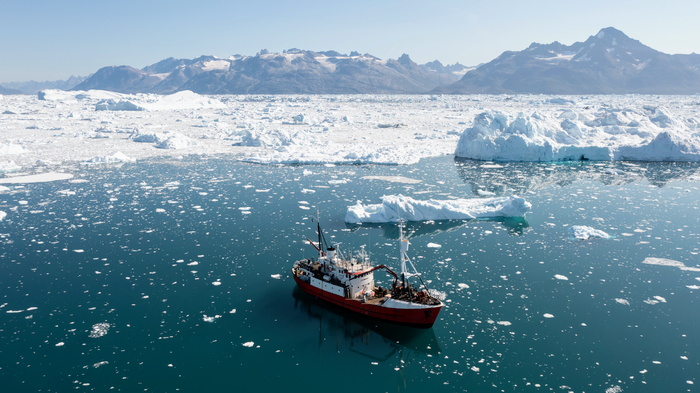
Greenland ice sheet is less stable than previously thought
In a new study from the University of Edinburgh, experts have determined that the Greenland ice sheet is more sensitive to climate change than expected. The researchers found that rising temperatures are amplifying the effects of melting caused by ocean warming.
While it was previously established that the Greenland ice sheet is shrinking as a result of warmer air and ocean water, the current study describes how these two stressors combine to worsen the effects. The researchers compare this phenomenon to how ice cubes melt more quickly if they are in a drink that is being stirred.
“The effect we investigated is a bit like ice cubes melting in a drink – ice cubes will obviously melt faster in a warm drink than in a cold drink, hence the edges of the Greenland ice sheet melt faster if the ocean is warmer. But ice cubes in a drink will also melt faster if you stir the drink, and rising air temperatures in Greenland effectively result in a stirring of the ocean close to the ice sheet, causing faster melting of the ice sheet by the ocean,” explained study lead author Dr. Donald Slater.
Warm air temperatures melt the surface of the Greenland ice sheet. When the meltwater flows into the ocean, this creates turbulence that causes more heat to melt the edges of the ice sheet that are submerged in the ocean, which is known as submarine melting.
After analyzing the 40-year period from 1979 to 2018, the researchers found that air temperature has had almost as much influence on submarine melting as ocean temperature. The experts determined that if the atmosphere had not warmed since 1979, the retreat of Greenland ice associated with submarine melting could have been reduced by up to half.
“This unfortunately adds to the overwhelming body of evidence showing the sensitivity of the Greenland ice sheet to climate change, hence the need for urgent action to reduce greenhouse gas emissions,” said Dr. Slater.
The study is published in the journal Nature Geoscience.
Image Credit: Jamie Holte
Check us out on EarthSnap, a free app brought to you by Eric Ralls and Earth.com.
–—
By Chrissy Sexton, Earth.com Staff Writer













